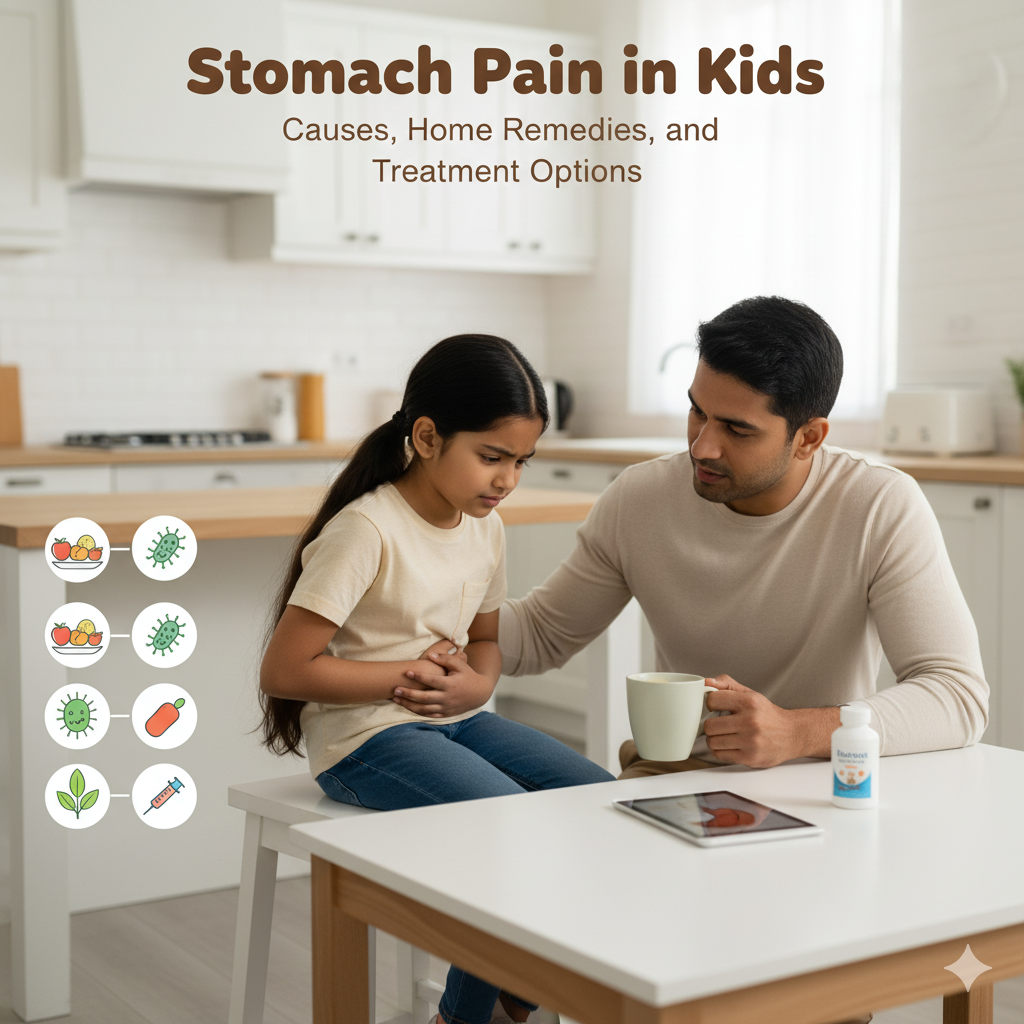Stomach Pain in Kids: Causes, Home Remedies, and Treatment Options
-
amrit1096
- Posted on
- 0 comments

Stomach Pain in Kids: Causes, Home Remedies & When to Seek Medical Help
Introduction
Stomach pain is one of the most common complaints in children and often leads to visits to the doctor. While most cases are mild and caused by things like indigestion, constipation, or stress, some instances may signal a serious condition such as appendicitis, urinary tract infection, or other medical issues. Knowing the causes, home remedies, and when to seek help is key to your child’s well-being.
Common Causes of Stomach Pain in Kids
- Gas & Bloating: Swallowed air or certain foods can cause discomfort.
- Indigestion/Overeating: Heavy, spicy, or oily foods may upset the stomach.
- Constipation: Low fibre intake or irregular toilet habits can lead to stomach pain.
- Stomach Infections: Viral, bacterial, or parasitic infections can cause cramps.
- Food Allergies/Intolerances: Lactose intolerance or nut allergies can trigger pain.
- Worm Infestation: Poor hygiene or contaminated food/water can lead to abdominal discomfort.
- Stress & Anxiety: Emotional distress can sometimes manifest as stomach pain.
Less common but serious causes include appendicitis, inflammatory bowel disease, urinary tract infections, gallstones, ulcers, metabolic disorders, and abdominal tumors. Always consult a doctor if your child has persistent, severe, or unusual symptoms.
Home Remedies for Stomach Pain in Kids
These remedies are safe for general relief but do not replace medical treatment:
- Hydration: Ensure your child drinks enough water or clear fluids and rests adequately.
- Warm Compress: Place a warm water bottle on the stomach or give a warm bath to ease cramps.
- Light Diet: Offer easily digestible meals like buttermilk, rice, millets, or curd rice.
- Abdominal Massage: Gentle clockwise massage can help relieve bloating and cramps.
- Physical Activity: Light movement like walking can help with gas and constipation.
- Traditional Remedies: Small amounts of hing (asafoetida) around the navel or cumin/ajwain water may aid digestion. Peppermint oil may also reduce severity and duration of pain.
Treatment Options
Medication should always be guided by a pediatrician:
- Pain Relievers: Paracetamol for discomfort. Avoid aspirin or ibuprofen unless prescribed.
- Deworming: Only if diagnosed, typically using albendazole or mebendazole.
- Antibiotics: Prescribed only for confirmed bacterial infections.
Lifestyle and dietary changes such as balanced meals, hydration, fiber intake, regular meal timings, and stress management can prevent recurrence.
When to See a Doctor
Seek immediate medical attention if your child has:
- Severe, persistent, or sudden sharp abdominal pain (especially right-side pain)
- Fever, chills, pallor, excessive sweating, or prolonged vomiting
- Signs of dehydration (reduced urination, dry lips, sunken eyes)
- Vomiting blood, blood in stools, or sudden abdominal rigidity
- Ongoing diarrhea, unexplained weight loss, or poor appetite
Prevention Tips
- Encourage proper handwashing before meals and after using the toilet.
- Wash fruits and vegetables thoroughly.
- Limit junk food, fried snacks, and carbonated drinks.
- Promote regular bowel habits and avoid withholding stools.
- Keep your child hydrated with water and healthy fluids.
Conclusion
Most stomach pain in children is mild and resolves with care, hydration, and a healthy lifestyle. However, persistent or severe pain, especially with warning signs like fever, vomiting, blood in stools, or weight loss, requires prompt medical attention. Following good dietary, hygiene, and lifestyle habits helps maintain digestive health and overall well-being of your child.
Frequently Asked Questions (FAQs)
Q1: When should I worry about my child's stomach pain?
A: If the pain is severe, persistent, associated with fever, vomiting, blood in stools, or unusual fatigue, consult a doctor immediately.
Q2: Can home remedies completely cure stomach pain?
A: Home remedies provide relief for mild cases but do not replace medical evaluation for serious conditions.
Q3: How can I prevent frequent stomach pain in my child?
A: Encourage good hygiene, balanced diet, hydration, regular bowel habits, and limit junk food.








































